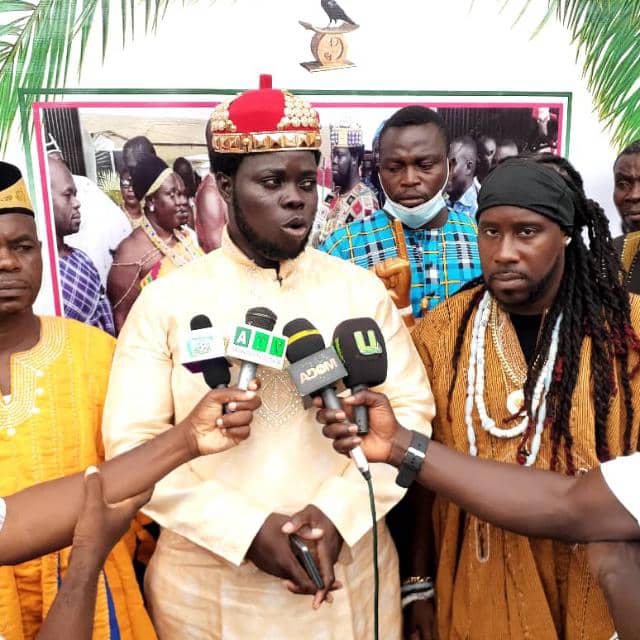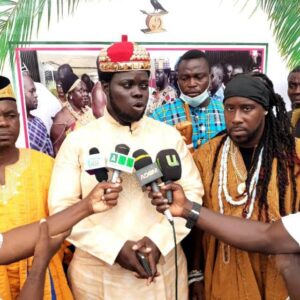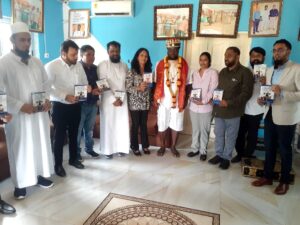
King Ayitey Anumle Oyanka I of Ghana has been appointed as the Chairman of the International Human Rights Association (IHRA) for the West African region, in a major recognition of his ongoing work in promoting justice, equality, and development across the continent.
The IHRA, a global organization affiliated with United Nations agencies and the International Bar Association, made the announcement as part of its expanded operations in Africa. King Oyanka’s appointment marks a renewed commitment by the IHRA to advance its mission across key developmental and human rights sectors in West Africa.
Humanitarian Mission and Goals
The International Human Rights Association operates on a broad platform aimed at creating a just and fearless society rooted in truth and nonviolence. Its mission focuses on supporting marginalized communities, including persons with disabilities, the elderly, widows, and those living below the poverty line—regardless of caste, creed, gender, or religion.
Its work spans across a range of sectors, including:
Human Resource Development
Health and Family Welfare
Agriculture and Allied Industry Development
Environment and Forestry
Rural and Urban Development
Social Justice and Empowerment
Youth Affairs and Sports
Science, Technology, and Information Communication
Human Rights Advocacy
The IHRA also manages several operational arms such as legal aid centers, accident relief units, consumer forums, and women and labor welfare cells. One of its key goals is to create global awareness about human rights violations and provide a reliable platform for grievance redressal, without charging any fees for complaints.
A Vision of Human Rights Leadership
With a vision to create a global society of human rights followers, the IHRA sees its expansion into West Africa as crucial. According to the organization’s charter, “This society will allow the peaceful existence of all types of naturally challenged persons, the elderly, the poor, and the downtrodden, led by the torchbearers of truth and human dignity.”
The association encourages national and international volunteers to join its cause and participate in programs focused on legal literacy, medical outreach, and collaborative justice platforms such as Lok Adalats and public grievance courts.
About King Oyanka
King Ayitey Anumle Oyanka I is a traditional ruler and Chair of the Anamase Royal Alliance Council of Akyem Bosome Anamase, in Ghana’s Eastern Region. His involvement in humanitarian efforts, especially in education and child welfare, has earned him wide recognition beyond the borders of Ghana.
In a 2024 proclamation, the Montessori Model United Nations (MMUN) appointed King Oyanka as the Honorary Emissary of Education for West Africa. The title acknowledged his ongoing advocacy for children’s education and his efforts in encouraging Ghanaian youth to pursue learning as a path to empowerment.
In 2021, he was also appointed as Chairman for the World Human Rights Council (WHRC) in Ghana and Africa by the WHRC’s Board of Governors, underscoring his growing influence in human rights governance across the continent.
Speaking on his latest appointment, King Oyanka said:
“I am honored to serve in this capacity and I take this responsibility seriously. It is a call to work for the protection of human dignity, equity, and justice, especially for the voiceless. I look forward to collaborating with governments, civil society, and international partners to advance the rights of every individual across West Africa.”
Upcoming Projects and Recognition
King Oyanka is also the subject of a newly published book titled “The Leadership Experience and Life of King Oyanka: The Digital Crypto Assets King of Africa.” The book, now available on Amazon and other international marketplaces, explores his journey as a traditional leader and advocate of digital transformation and human rights in Africa. Although not yet officially launched, the publication adds to the growing body of documentation on African leadership in global development.
The IHRA’s appointment of King Oyanka is expected to accelerate grassroots human rights activities, especially in rural and underserved areas, and promote collaboration between international institutions and African communities.
As the IHRA continues to expand its global footprint, King Oyanka’s leadership is seen as a strategic step in bridging the gap between traditional authority, modern governance, and international human rights obligations.



